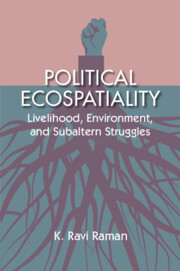Book contents
- Frontmatter
- Contents
- Acknowledgements
- 1 What Is Politics Proper? Why Political Ecospatiality Matters?
- 2 Birlas in Communist Kerala: Clash and Consensus as Subaltern Narratives
- 3 Occupy Muthanga: Land, Forest, and Reinventing Indigeneity and Identity
- 4 Dalits and the Global Cola: Water, Power, and Resistance
- 5 Politics, Epistemology, and Environmental Modernity: Anti-endosulfan as Ethical Practice?
- 6 Caste, Land, and the State: What If Chengara Took the Place of Muthanga?
- 7 Pombilai Orumai: Plantation Dalits, Intersectionality, and Power
- 8 Ecospatiality: Right-Making/State-Making
- Index
4 - Dalits and the Global Cola: Water, Power, and Resistance
Published online by Cambridge University Press: 31 August 2024
- Frontmatter
- Contents
- Acknowledgements
- 1 What Is Politics Proper? Why Political Ecospatiality Matters?
- 2 Birlas in Communist Kerala: Clash and Consensus as Subaltern Narratives
- 3 Occupy Muthanga: Land, Forest, and Reinventing Indigeneity and Identity
- 4 Dalits and the Global Cola: Water, Power, and Resistance
- 5 Politics, Epistemology, and Environmental Modernity: Anti-endosulfan as Ethical Practice?
- 6 Caste, Land, and the State: What If Chengara Took the Place of Muthanga?
- 7 Pombilai Orumai: Plantation Dalits, Intersectionality, and Power
- 8 Ecospatiality: Right-Making/State-Making
- Index
Summary
Mayilamma – the Dalit woman leader of the anti-Cola water movement in Plachimada – explicitly told this author: ‘I do not know whether it was due to globalization or not, what I know is that our wells are getting dried up; whatever little water left was polluted.’ This political statement came at a time when water has rapidly become a contested commodity worldwide, with local communities in many parts of the world suffering the threat of multinationals working in collusion with the state apparatus to usurp their precious natural resources, including in Plachimada.
There has been a recent proliferation of scholarship on water conflict and governance, both within and outside political landscapes, attempting to address the various nuances of global and local governance strategies. Increasing concern has been expressed regarding the widespread social and political-ecological implications of current and potential ‘water wars’ and water conflicts. Water supply, once considered a public utility or a service, is now fast becoming a marketable commodity, one that is to be sold on a full cost-recovery basis, an approach that is vehemently opposed by social agencies, which fight back, often as part of a wider struggle, but also within specific locales. Such movements throw into stark relief the ironies inherent in the discourse–counter-discourse (Grillo and Stirrat 1997; Terdiman 1985; Ashcroft 2001; Daudi 1983; Escobar 1985; Byrant and Baily 1997) generated as part of the process of conflict resolution. And now ‘governance’ as a conflict-resolution strategy wrought through the multiple agencies of a legislative, institutional, and regulatory framework promoting equitable access to and ecologically sustainable management of water resources appears to be the new polemics. This chapter critically engages with the multiple knowledge conflicts and the multiple agencies involved in the vexed question of water access, power, and community rights in Plachimada, a small hamlet in the Palakkad district of the south Indian state of Kerala.
Social movements by themselves are not merely sensitizers of the public, but have an important role to play in exposing the ever-increasing threats to marginalized communities in terms of their livelihood, culture, and ecology. The social agencies involved in these movements are also credited with exposing the untruth in claims made by scientific and expert knowledge in their reproduction of hegemonic power relations that gnaw away at the roots of community existence and the right to live.
- Type
- Chapter
- Information
- Political EcospatialityLivelihood, Environment, and Subaltern Struggles in Kerala, pp. 99 - 125Publisher: Cambridge University PressPrint publication year: 2025

